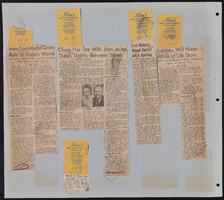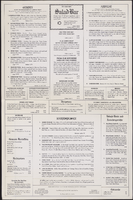Search the Special Collections and Archives Portal
Search Results
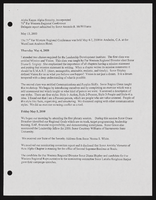
Alpha Kappa Alpha Sorority, Theta Theta Omega Chapter 71st Far West Regional conference reports
Date
Archival Collection
Description
From the Alpha Kappa Alpha Sorority, Incorporated, Theta Theta Omega Chapter Records (MS-01014) -- Chapter records file.
Text

Greg Phelps oral history interview: transcript
Date
Archival Collection
Description
Oral history interview with Greg Phelps conducted by Claytee D. White on November 15, 2017 for the Remembering 1 October Oral History Project. Greg Phelps discusses moving to Las Vegas, Nevada in 2002 for work and attending the 2017 Route 91 Harvest festival with his mother and wife. He describes the event venue as well as his recollection of the shooting. Phelps explains how his life changed after that day, describing the true friendships he gained and his greater appreciation for living.
Text
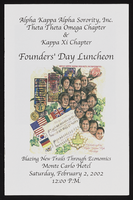
Alpha Kappa Alpha Sorority, Theta Theta Omega Chapter Founders' Day committee reports
Date
Archival Collection
Description
From the Alpha Kappa Alpha Sorority, Incorporated, Theta Theta Omega Chapter Records (MS-01014) -- Chapter records file.
Text
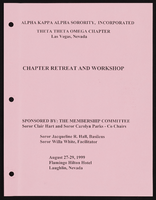
Alpha Kappa Alpha Sorority, Theta Theta Omega Chapter retreat and workshop agenda and documents
Date
Archival Collection
Description
From the Alpha Kappa Alpha Sorority, Incorporated, Theta Theta Omega Chapter Records (MS-01014) -- Chapter records file.
Text
Katherine A. Spilde Papers on Native American Gaming
Identifier
Abstract
The Katherine A. Spilde Papers on Native American Gaming include materials collected by anthropologist Katherine Spilde about Native American gaming and the greater gaming industry. The materials date from 1789 to 2015, with the bulk of materials dating from 1995 to 2010. Materials dating from the eighteenth and nineteenth centuries are reproductions of key court opinions and treaties concerning Native American rights and sovereignty. The majority of the materials document Native American gaming following the passage of the 1988 Indian Gaming Regulatory Act (IGRA). The papers detail Native American gaming enterprises both on and off reservations, the socioeconomic impact of gaming, and the legislative history of Native American gaming in the United States. The papers include research and subject files created by Dr. Spilde during her employment with the National Gambling Impact Study Commission (NGISC), the National Indian Gaming Association (NIGA), and the Harvard Project on American Indian Economic Development (HPAIED). The collection includes socioeconomic reports; testimonies; correspondence; memos; press releases; photographs; audiovisual materials; promotional materials from casinos and tourist attractions; brochures; fact sheets; summaries; booklets; pamphlets; advertisements; tourism materials; journal articles; legal briefs; legislative documents; court opinions; Dr. Spilde’s notes; presentations; packets, agenda, schedules, and itineraries from conferences; periodicals; Native American and community newspapers; and newspaper articles. The collection includes materials about over one hundred federally recognized Native American nations. Also included are materials that document the socioeconomic impact of gaming, the international gaming industry, criminal activities related to gaming, advertising about gaming and casinos, lotteries, internet gaming, compulsive gambling, and bankruptcy as a result of gambling.
Archival Collection

Steve Jones and Bart Jones interview, Novermber 7, 2016: transcript
Date
Archival Collection
Description
Brothers Steve and Bart Jones live and breathe Las Vegas history. Their grandparents, Burley and Arlie Jones, arrived in Las Vegas in the nineteen-teens; their father, Herb Jones; his sister, Florence Lee Jones Cahlan, and their uncle, Cliff Jones, helped form the legal, journalistic, and water policy framework that sustains Southern Nevada today. The Jones brothers build on that foundation through their custom home-building company, Merlin Construction. In this interview, they talk about living and growing up in Las Vegas, of attending John S. Park Elementary School, of hunting in the desert, of their family's commitment to cultural and racial diversity, and of accompanying their grandfather to his business at the Ranch Market in the Westside. They share their early work experiences lifeguarding and later, dealing, at local casinos as well as second-hand memories of the Kefauver trials through the tales told by their father and uncle. Steve describes mentor Audie Coker; he explains
Text

Transcript of interview with Byron Underhill by Joyce Moore, March 20, 2002
Date
Archival Collection
Description
Byron Underhill's father owned the first Coca-Cola bottling plant, the first beer distributorship, and the first bowling alley in Las Vegas. Byron moved here from Needles, Calif., with his family in 1927. Byron later took over the bottling plant, served in the Army as an aircraft mechanic and a glider pilot during World War II, was a private pilot who worked with Search and Rescue, played in various bands, and suggested to the Lions club that they found a burn unit at University Medical Center that is still the only one in the state
Text

Transcript of interview with Christie Young by Dennis McBride, October 18, 1998
Date
Archival Collection
Description
I've known Christie Young for many years and was grateful she agreed to be interviewed for the Las Vegas Gay Archives Oral History Project. Not only is she frank in what she says, but her background as a researcher in sexual issues and as a straight woman involved in the gay community give her a unique perspective. Ancillary to her donation of this interview transcript to the University of Nevada, Las Vegas, Christie has generously donated her personal journals which detail more than a decade of her life including the years she worked with Las Vegas's gay community . Christie shares the project's concern that documentation of the gay community is ephemeral and vanishes rapidly; her determination that her contribution to that community be preserved greatly enriches our knowledge and will benefit future scholars.
Text

